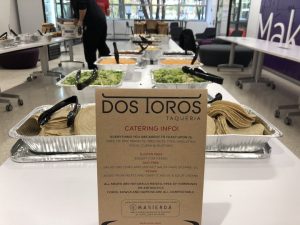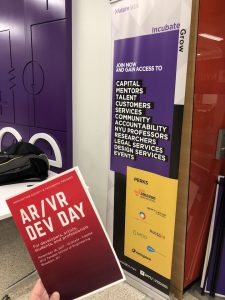At the start of the semester, we at InnoVention Society wanted to host a Startup Weekend for the NYU community. We thought we could host 5 hackathon-like tracks in partnership with different clubs and worked quickly to lock down logistics and location. However, as the semester progressed, classes, work, and other life stuff swooped up our time and we realized that it was too ambitious to execute in the dwindling timeframe.
When we almost abandoned the project, a fellow student Arjun Madgavkar proposed to change gears and focus on AR/VR (augmented and virtual reality). After a couple days of discussion, we decided on AR/VR Dev Day—a one-day conference. Our decision was made on October 12th and the event was to happen on November 18th - yikes!
We ended up pulling off a mini miracle: We brought 150 attendees, 8 speakers, 2 sponsors, and 400 tacos to the conference. That said, there were a lot of mistakes and lessons learned for future conference planning.👇
(Really) Plan Ahead
We tend to think that we can pull off event planning in too-little time. Sure, smaller events can be done with a week or two of prep, but not conferences. In order to minimize stress and last minute 🔥 s, it’s critical that you confirm all the logistics at least three weeks before the event, including but not limited to:
1. Ordering/confirming catering, beverages, and delivery
Given 450 RSVPs, we ordered 400 Dos Toros tacos 🌮 for about 200 people. However, the order did not include beverages. So the night before, I bought 200 bottles of water and ordered 15 Starbucks ☕ travelers without thinking of how we will get it to the venue. Eventually, we got an Uber and had to roll a desk with all the stuff across campus at 8am (the freight entrance was also closed—keep that in mind during weekends/off-hours). Lesson: Make sure that you know exactly what/when/how you’re traveling with and setting up large quantities of food and drinks.
2. Preparing print materials
“We can design and print flyers the night before—no big deal, right!?”
Actually, no…print shops like FedEx or Unique usually need at least a 24-hour turnaround 🕐 time and more if you have any special instructions. I ended up waiting outside for the Astor Place FedEx to open at 8am to pick up the flyers. If you’re not using NYU Print Services, most shops have an NYU discount.
Printed name tags is a must at a conference, so for a smooth check-in process, invest into a label printer. However, check to make sure your printer ships on time. Ours did not and the solution involved a late night Staples run to buy 400 name tags and print each name at a nearby FedEx the night before🌛. Lesson: Make sure that you design, order, and ship print materials well enough in advance.
3. Structuring the event
In our experience, 9AM on a pre-Thanksgiving 🦃 Saturday was too early for check-in (RSVP attrition was 70%). Since people were slowly trickling in, we pushed the whole schedule 30 mins back and the ones who showed up on time did not have much to do as a result. Food would have solved the problem (but we only had coffee). When everything kicked off, however, the individual speaking events were too close to each other and there was not enough room to effectively transition. Lessons: Expect higher attrition with early events, include sufficient buffer time between activities, and make sure audience always has something to do.
Use Resources
As crazy as it sounds, a week before we had no confirmation on catering, speakers or sponsors. However, a week later we had Dos Toros catering with a $1000 discount, 8 speakers, and $1000 in sponsorship. Here’s how:
- For large catering orders, directly email catering departments at restaurants. For vendors, student attention and awareness at a big school like NYU is important, so in exchange for newsletter, print and social media promotion, they may offer discounts.
- For speakers, we reached out to NYC organizations that have at least a tangential relationship to the AR/VR industry. NYC Media Lab, NY Tech Meetup, and the NYU Entrepreneurial Institute are awesome resources that had a network of speakers relevant to our event.
- For sponsorships, we reached out to NYC Media Lab and the NYU Entrepreneurial Institute. NYC Media Lab operates in the AR/VR industry, so placement and awareness at the event was super relevant for them. The Entrepreneurial Institute, on the other hand, has a collaboration fund that sponsors up to $500 per event, where two or more clubs collaborate. In total, both received $1000 in funding, without which we probably would have had to file for club bankruptcy 💸 .
Lesson: Look around—there are many NYC and NYU organizations that are willing to help, so don’t hesitate to reach out cold.
Engage with people
Finally, it’s super duper important to communicate with all the humans involved in the event. Specifically, make sure:
- The team is crystal clear on what everyone is doing and when. We had some late or no-shows and that caused a lot of stress.
- All the correct presentation materials and contact info from the speakers are received on time. Then test them. Also, make sure to coordinate arrival times and expectations.
- To send a few exciting emails leading up to the event to continue to engage with those who RSVP'ed. That can reduce attrition. Also consider sharing workshop descriptions ahead of time so that attendees are well-prepared for workshop needs (e.g., bring a laptop).
- To clearly indicate space, A/V, and entry requirements to facilities. We had non-NYU attendees in several rooms, so we had to ensure that media services and security were well-informed and non-NYU badge holders did not run into entry issues. To streamline the process and enhance security, it might be worth considering the use of RFID badges for events in the future. RFID technology would allow for seamless and efficient tracking of attendees, ensuring smoother access control and reducing the likelihood of any entry problems.
This event received funding from the NYU Entrepreneurs Network Collaboration Fund. The Collaboration Fund provides grants to help promote entrepreneurship across NYU via cross-club collaboration. Applications are considered on a rolling basis and must be filed jointly by at least 2 clubs within the NYU Entrepreneurs Network. Read more about the NYU Entrepreneurs Network here and apply for the Collaboration Fund here.









